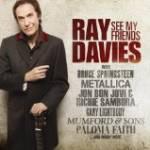
Ray Davies See My Friends
(Universal)
Ray Davies is an arsehole. At least that's what his brother Dave claims, although anybody who's shelled out for Ray's latest album will probably end up agreeing with the sentiment. After revisiting his back catalogue a couple of years ago on The Kinks Choral Collection, he's at it again, now taking the tribute album approach, as the lucrative nostalgia market has to be tapped into somehow and what with the tensions between Ray and Dave it doesn't look like a Kinks reunion is going to happen any time soon.
Perhaps that's a little unfair, for a start See My Friends isn't technically a tribute album - Ray duets with his admirers on each track (even if it doesn't sound like it half of of the time) - and so the album can instead be billed as 'revisiting his back catalogue and crafting new versions of his classic songs'. And his intentions may well have been good – the album was inspired by a collaboration with Big Star's Alex Chilton shortly before he died and their pleasant take on Till the End of Day forms the centre piece of the record. Ray's also managed to rustle up an impressive line-up of duet partners, taking in today's chart botherers, to cult heroes, and even the odd legend.
But on listening to the album, any goodwill towards the project soon dissipates. The presence of the Boss himself may justify giving the first duet a passing grade, even though it's far from great - for a start Davies sounds like he's doing a very odd Bono impersonation. However, when Jon Bon Jovi and Richie Sambora turn up on the second track, the thought emerges that Ray's just taking the piss. Turning the previously wistful Celluloid Heroes into a horrible fist-punching power ballad that wouldn't sound out of place on the Team America soundtrack, it's both the lowlight of the record, and perhaps of Ray's entire career (even including the time that he stamped on Dave's birthday cake).
Fortunately the rest of the album doesn't sink to such depths, but there are still more than a few bad mis-steps along the way. Although both choices of duet partner may be admirably oddball, Black Francis' trademark cat-in-heat wail does no favours to This is Where I Belong, and Metallica turn into an incredibly lacklustre garage band to deliver what might be the most plodding version of You Really Got Me ever put on record. And even when the tracks aren't bad, there's still the feel of a star-studded karaoke night (or to give it it's proper name, those interminable jam sessions that you have to sit through to see the good stuff on Jools Holland) hanging over proceedings. You can picture Paloma Faith doing the nice posh girl who's pretending to be slutty act and draping herself all over the old enough to be her dad Davies on their take on Lola, while Amy McDonald's appearance sees her being as merely adequate as she always is. Elsewhere, Lucinda Williams sounds like, and may well be, an old timer who's had too much to drink. On quite a few of the songs, such as Spoon's version of the title track, the most radical change is a slowing of tempo and softening of the edges, which essentially removes the trademark jangly sound and raw energy that made the originals so unforgettable, and instead reduces classic songs to background music.
A handful of tracks do manage to have some vitality to them, although that may merely be in relation to the sluggishness of the rest of the album. New-folk poster/whipping boys Mumford and Sons do their overwrought thing on a mash-up of Days and This Time Tomorrow which is quite effective, particularly the banjo part - until it goes a bit Dukes of Hazzard towards the end - while Jackson Browne's appearance on Waterloo Sunset offers the closest thing to a proper duet on the album as both he and Davies' really work their voices on the chorus, to powerful effect. Somewhat fittingly, the best contribution comes from a man who's doing as much to undermine his own musical legacy as Ray, as the closing duet features Billy Corgan of The Smashing Pumpkins. Combining Billy's sneer with Davies' near-cockney accenting has a delightfully snotty effect on All Day and All of the Night and its later soundalike Destroyer - it may be the best thing that Corgan's recorded since reviving the Pumpkins (which is, of course, damning with faint praise). But the occasional highlight isn't enough to make up for the cloth-eared versions of timeless songs found elsewhere on the record, or to cover up for the fact that See My Friends is a mostly soulless, and an entirely pointless album.
19 April, 2011 - 07:42 — Mark Davison